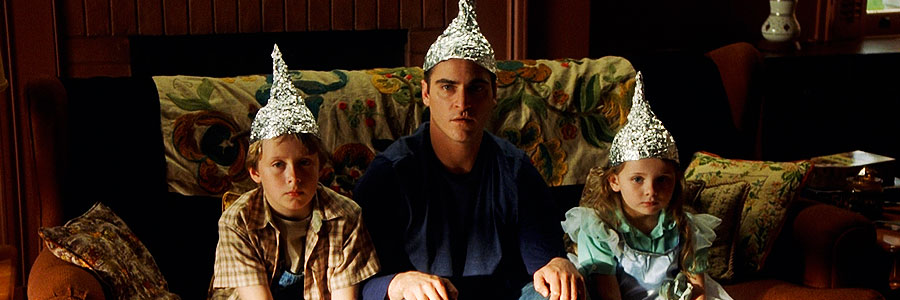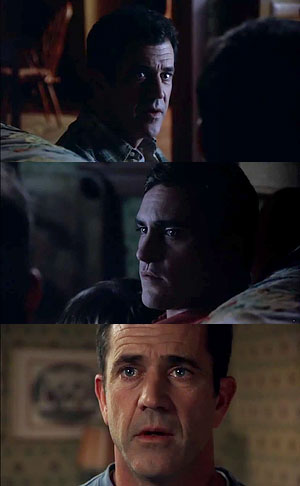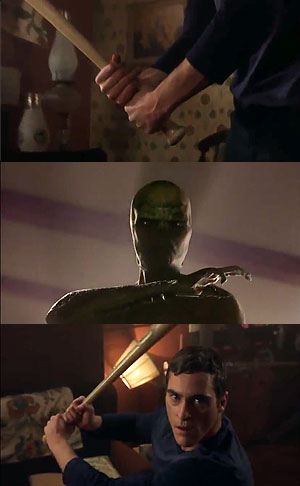
Signs
Touchstone Pictures
Blinding Edge Pictures
Original release: July 29th, 2002
Running time: 106 minutes
Writer/Director: M. Night Shyamalan
Composer: James Newton Howard
Cast: Mel Gibson, Joaquin Phoenix,
Rory Culkin, Abigail Breslin,
Cherry Jones, M. Night Shyamalan
Alien threatens Morgan:
01:30 to 01:34
Deconstructing Cinema: One Scene At A Time, the complete series so far
“To the mind that is still, the whole
universe surrenders.” ~ Lao Tzu
There’s wonder in stillness, moments when nothing happens or so little I can hear voices in the wind. I let go, gaze at the sky and right through it, make all thoughts abscond to wherever and whenever — until the slightest noise is only a distant sign of me being alive.
Sooner or later, something breaks into this total silence, and all thoughts return and with them the noise of life.
 To me, M. Night Shyamalan’s 2002 film Signs is about making the unbelievable likely, listening within rather than looking outwards, and taking the smallest things as what they often are: signs. This is not an action film, not a science fiction movie, not a mystery thriller. In the end though, it’s all of the above. And silence.
To me, M. Night Shyamalan’s 2002 film Signs is about making the unbelievable likely, listening within rather than looking outwards, and taking the smallest things as what they often are: signs. This is not an action film, not a science fiction movie, not a mystery thriller. In the end though, it’s all of the above. And silence.
Shyamalan’s early films, beginning with The Sixth Sense (1999) and including Unbreakable (2000) and The Village (2004) seem to evoke apprehension from nothing or very little. His stories grow out of inconspicuous situations, by-the-way happenings and the seemingly unremarkable expressions of his characters — and often I’m reminded of Hitchcock’s joy of “playing the audience like a piano”.
In Signs, again, overwhelming emotions emerge from the few things said and the few things done. The rest happens in our heads, in our imagination and through the force of empathy. Ultimately, listening really is all that matters (not least thanks to J.N. Howard’s soundtrack).
We meet a small family. A priest-turned-farmer (Mel Gibson as “Father” Graham), his brother Merrill (Joaquin Phoenix) and Graham’s children Morgan (Rory Culkin) and Bo (Abigail Breslin). The family went through tragedy when their mother and wife was killed in a car accident caused by Ray Reddy (M. Night Shyamalan).
Then there are signs. Animals and people act strange, there are weird noises and nocturnal visitors. And crop circles. Graham, who had lost his faith already, finds  himself thrown into yet another crisis that will test him even more as the events interweave with memories of his late wife. But he’s not the only one sensing a subliminal but growing dread. His kids draw their own conclusions and prepare for the encounter with extraterrestrials whose arrival has meanwhile been announced on TV.
himself thrown into yet another crisis that will test him even more as the events interweave with memories of his late wife. But he’s not the only one sensing a subliminal but growing dread. His kids draw their own conclusions and prepare for the encounter with extraterrestrials whose arrival has meanwhile been announced on TV.
At face value, the film seems to be all about fear but in the end, Signs is the metaphorical nudge to see beyond the signs and realise there actually is more between heaven and earth than meets the eye — and that the deepest disquiet, more often than not, is but a figment of our minds. Although Graham, again and again, is hard on his God, it’s the ex-priest who, in an act of faith, sets out to save his son’s life.
During the climax, when the menace appears to be over, it is not. Confronted with the unthinkable — an Alien threatening Morgan — Graham recalls the moments when he talked to his dying wife, just after the accident.
 COLLEEN
COLLEENIt was meant to be.
GRAHAM
Does it hurt?
COLLEEN
I don’t feel much.
GRAHAM
Good.
COLLEEN
Tell Morgan to play games…
It’s ok to be silly.
GRAHAM
I will.
COLLEEN
Tell Bo to listen to her brother. He’ll always take care of her.
GRAHAM
I will.
COLLEEN
And tell Graham…
GRAHAM
I’m here…
COLLEEN
Tell him… to see. Tell him to see… And tell Merrill to swing away.
 Graham’s brother Merrill, a former baseball player, still relies on his older brother to comfort him, something the disheartened man can no longer offer. Whereas his wife’s fate, time and again, is the subject of Graham’s flashbacks, in this scene it’s a conversation he previously had with his brother that ties the strings of the fateful story together.
Graham’s brother Merrill, a former baseball player, still relies on his older brother to comfort him, something the disheartened man can no longer offer. Whereas his wife’s fate, time and again, is the subject of Graham’s flashbacks, in this scene it’s a conversation he previously had with his brother that ties the strings of the fateful story together.
GRAHAM
You have to ask yourself, what kind of person are you. Are you the kind that sees signs, sees miracles, or do you believe that people just get lucky… Is it possible… there are no coincidences?
Ultimately, there might be an element of destiny in everything, a meaning maybe, or an opportunity for us to grasp, in a life-saving moment of epiphany. Despite the menacing undercurrent in Signs, this scene seems to reveal quite a different view — which is more than the term faith is standing for both. Belief and trust.
 The Alien scene closes the circle that began in the crops where it was just a sign, something that defies interpretation as long as we don’t really have to face it. Signs are everywhere, it’s what we make of them that matters, if we chose not to ignore them.
The Alien scene closes the circle that began in the crops where it was just a sign, something that defies interpretation as long as we don’t really have to face it. Signs are everywhere, it’s what we make of them that matters, if we chose not to ignore them.
When filming on Signs began in 2001, just after 9/11, the world as we knew it had just ended, and from one day to the next we found ourselves in a new age that — coincidently or not — has grown to be an age of dread and overwhelming anxieties where more and more people feel alienated and forgotten. The dying words of Graham’s wife, when she tells him to see, sound like a prophecy that reaches beyond the film, and is maybe its message.
We need stillness to see, and we need stillness to listen. Almost two decades after Signs was released, the film, and especially the alien scene, can be watched in a historical context that was merely a writing on the wall in 2001. In a way, Shyamalan has created a new archetype; substituting the pay-off with a set-up — one that will never be resolved because it lies in the eye of the beholder alone, or because any certainty would taste of imperfection…
Just see, and swing away.

Jonahh Oestreich
One of the Editors in Chief and our webmaster, Jonahh has been working in the media industry for over 20 years, mainly in television, design and art. As a boy, he made his first short film with an 8mm camera and the help of his father. His obsession with (moving) images and stories hasn’t faded since.
You can follow Jonahh on Twitter @Jonahh_O.
© 2022 STATIC MASS EMPORIUM . All Rights Reserved. Powered by METATEMPUS | creative.timeless.personal. | DISCLAIMER, TERMS & CONDITIONS
HOME | ABOUT | CONTACT | TWITTER | GOOGLE+ | FACEBOOK | TUMBLR | YOUTUBE | RSS FEED
CINEMA REVIEWS | BLU-RAY & DVD | THE EMPORIUM | DOCUMENTARIES | WORLD CINEMA | CULT MOVIES | INDIAN CINEMA | EARLY CINEMA
MOVIE CLASSICS | DECONSTRUCTING CINEMA | SOUNDTRACKS | INTERVIEWS | THE DIRECTOR’S CHAIR | JAPANESE CINEMA





